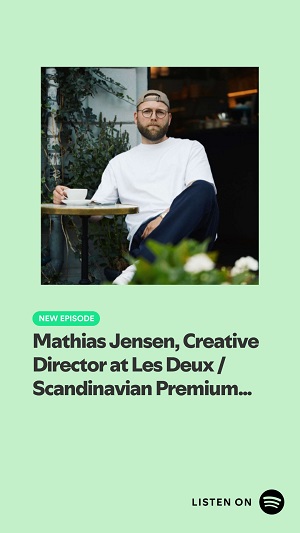1
HOME > Brands >
THE BEST MEN’S DENIM BRANDS
Written by Ivan Yaskey in Brands on the 20th September 2023
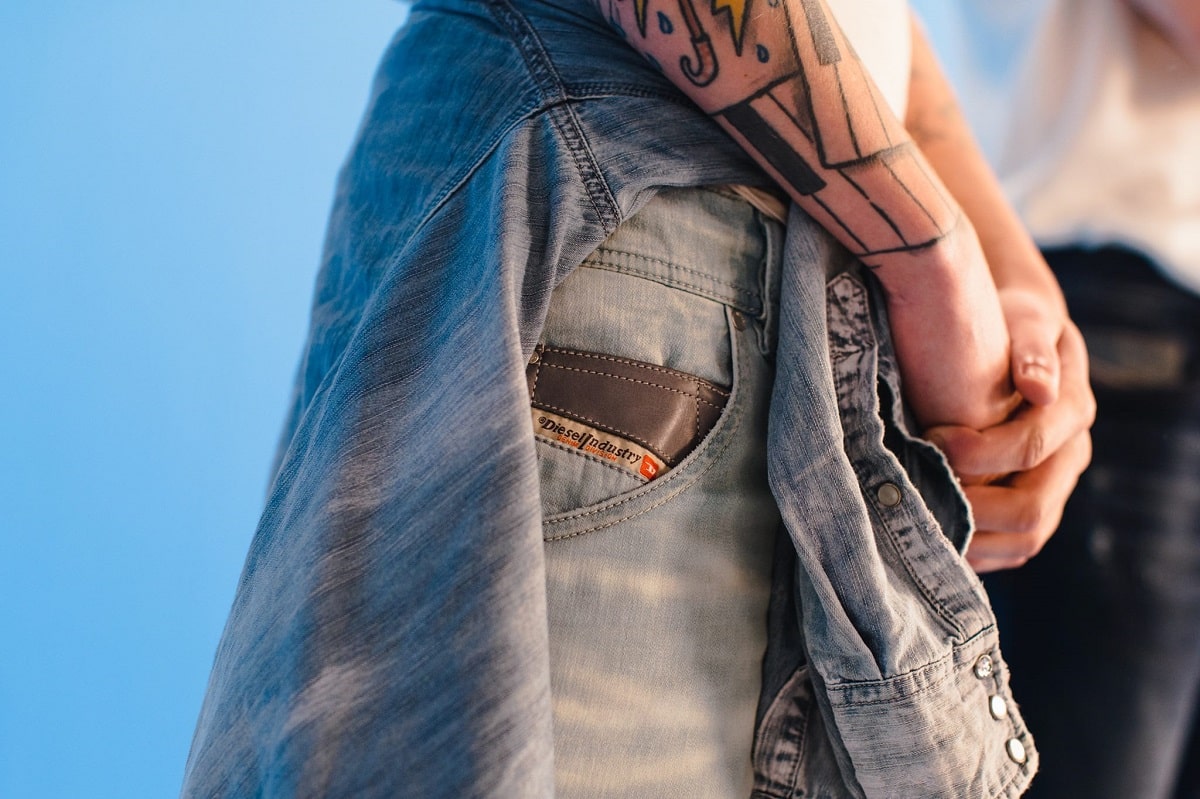
Denim used to be simple. Cotton, indigo dyed, and made to soften and shape through years of wear. A mix of consumer demands evolved this base product – itself starting as workwear and eventually used by the U.S. Navy – to encompass multiple finishes, washes, fabrications, and weaving methods. Acid washed, stone washed, or bleached? Ultra-skinny with spandex to raw and relaxed? It all falls under the vast umbrella characterizing the modern denim market. As such, naming a best denim brand often comes down to how well they cover this full spectrum or if they hone a specialty – for example, splatter-painted biker jeans with iron on patches or exclusively Japanese selvedge denim. Then, of course, there’s knowing what works for your body and comfort level, and all the factors that now go into selecting the perfect pair of jeans. We’ve rounded up a diverse array of denim brands based on style, construction, and the expected versatility to appeal to a broad swath of consumers:
The Classics
Some brands hold up no matter the season, trend, or what consumers and menswear enthusiasts prefer:
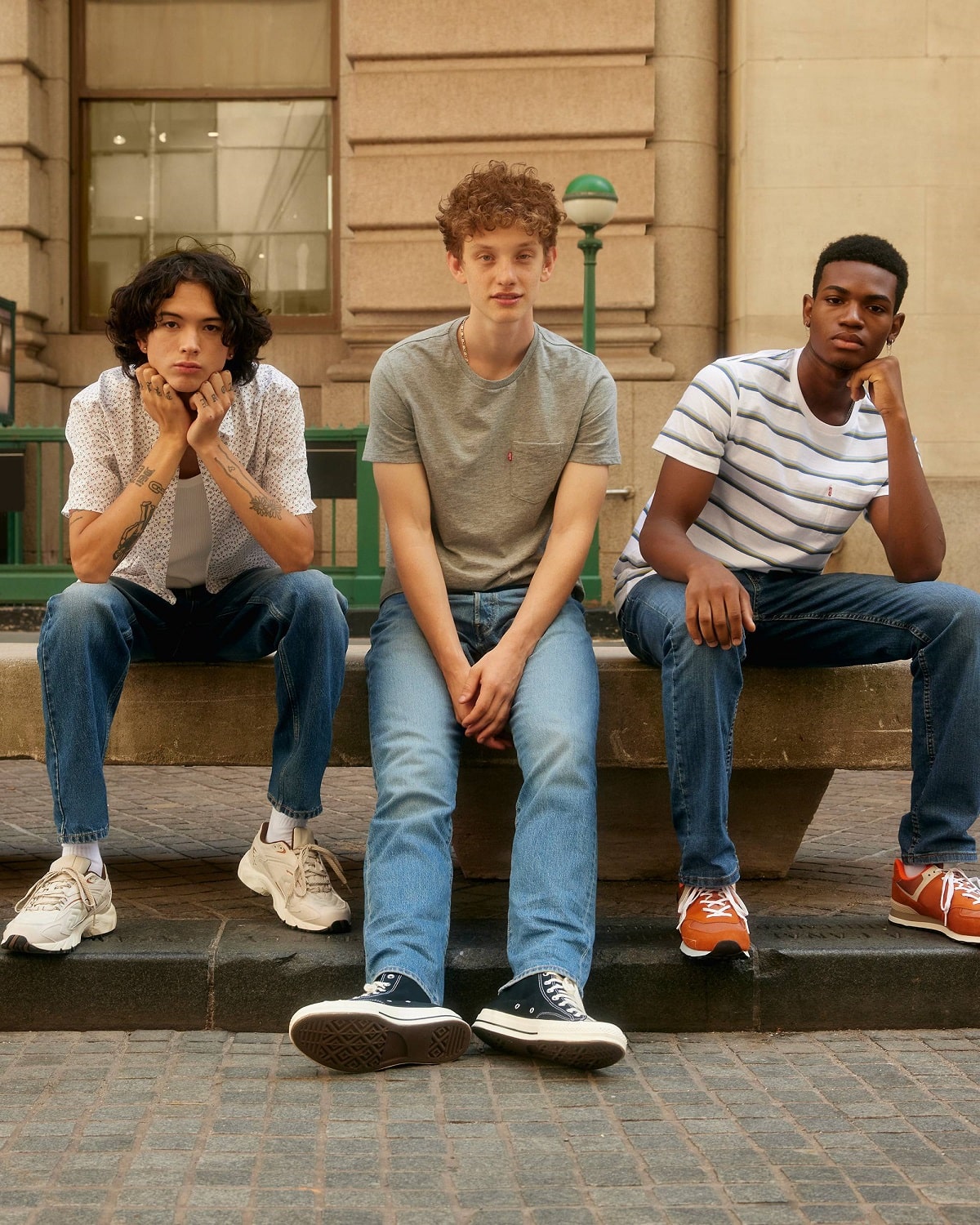
Levi’s
Yes, you’ll hear that Levi’s changed their construction over the past 20 years – but they’ve also been adapting their line in response to consumer trends since launching in 1873. What started as a workwear brand evolved into the work horse of casual denim by the mid-20th century and has diversified in response: Tapered to relaxed and wider cut, 100% cotton to a touch of stretch, Levi’s does it all – and does it well – without pretention.
Wrangler
Yes, boot cut jeans have returned – in a nod to their ubiquity during the Y2K era. But, regardless of what’s trending, Wrangler stands on a foundation as a cowboy jean: They’re not quite workwear – that would have to go to the double-knee-pocketed designs of Carhartt and Dickies – but still factors in hard-wearing use without jacking up the price. Yes, they’re typically found at discount, rodeo, and farm supply stores in the U.S., but that’s part of their appeal: They’re mid-weight, sturdy, and above bending over backwards for the latest trends.
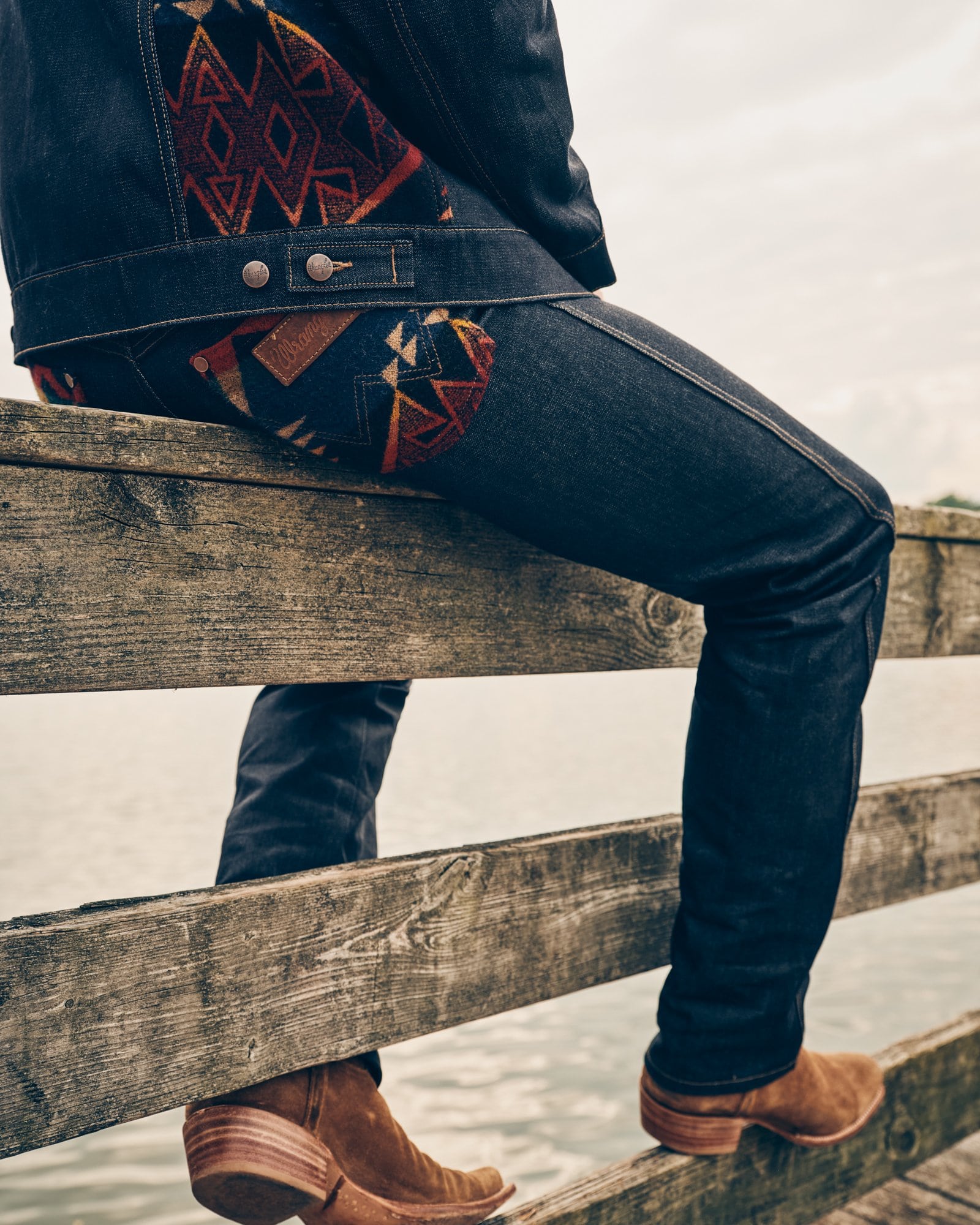
Affordable Men’s Jeans
You can still find a decent pair of men’s jeans at the mall – or even a browse online for under $200:
J.Crew
J.Crew does unpretentious preppy staples well, and its denim is no different. Styles span skinny and straight to workwear influences, 100% cotton based on 1950s construction to a hint of stretch intended to resonate with modern consumers.
Madewell
When Madewell made the transition to menswear roughly six years ago, denim marked its first endeavor. Today, this initial effort remains the core of its product line, resulting in silhouettes made with premium ringspun fabric that’s lightly distressed and fits well. As the denim market continues to diversify, so have its materials, from rigid, midweight 100% cotton to its Authentic Flex with a smidge of stretch to its ultra-soft Everyday Flex and the inclusion of CoolMax® for controlling perspiration.
The Gap
The Gap embodies the ‘90s mall brand, and while sales have declined in recent years, denim remains the apex of its offerings. You might recall some of their commercials from the ‘90s and 2000s, but today, their stonewashed heyday translates to a modestly priced, long-lasting pair of jeans. Added to this, The Gap doesn’t attempt to reinvent the wheel, instead nodding to how denim used to be constructed with its Washwell series.
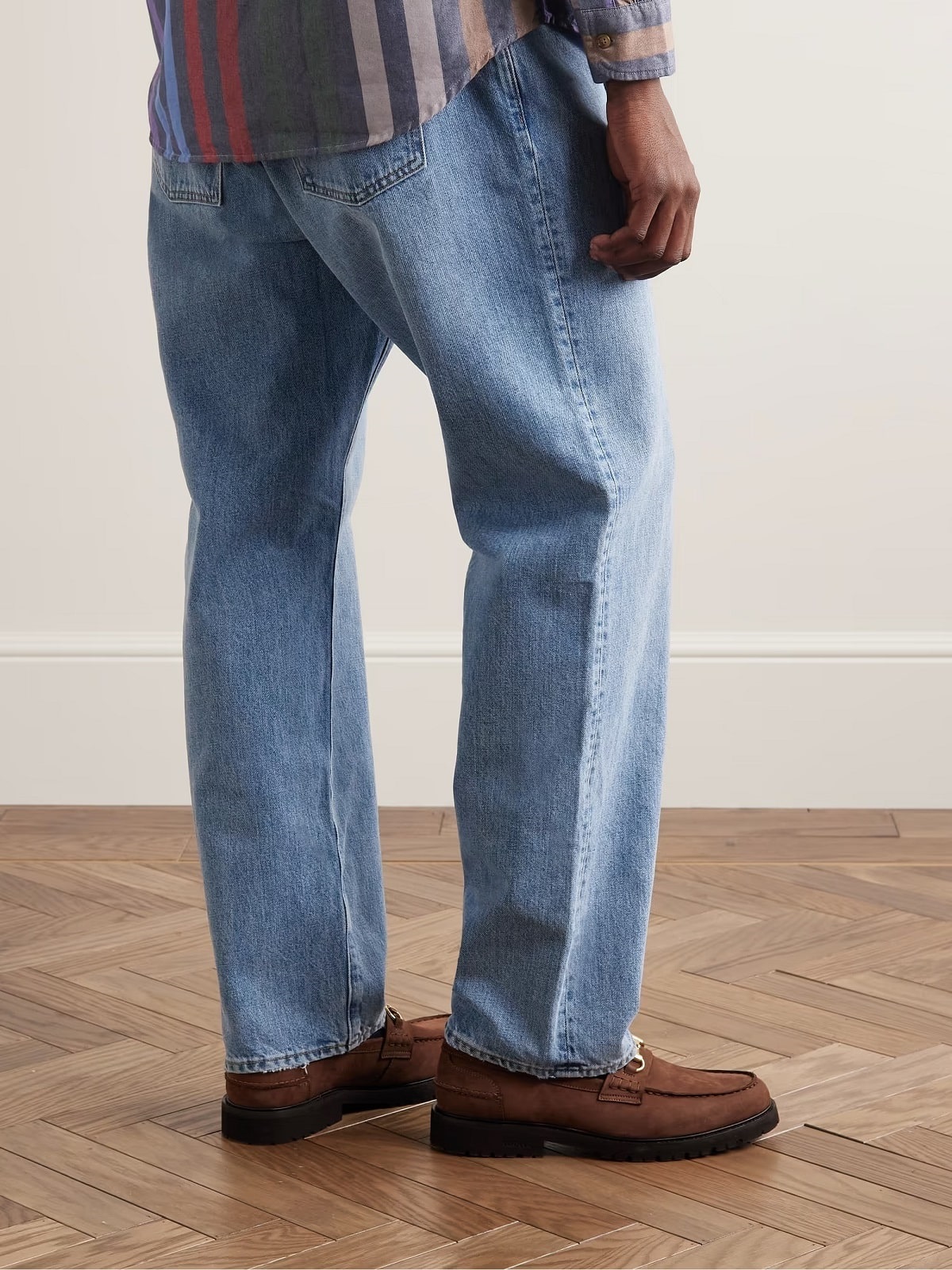
Sernes
To the other end of the denim spectrum, diversification means that slim to relaxed with a light to dark wash just touches the surface. Rather, biker styles, rips, distressing, patches, and bleaching add character in varying degrees. Starting a few years ago as a men’s denim brand and expanding to more unisex offerings, Sernes travels this path, seeing cotton with a hint of spandex as a canvas for multiple treatments. They don’t intend to blend in, and whether you go in a paint-splattered or ripped and patched direction, neither will you.
Paige
There’s debate around the legitimacy of stretch denim. In all cases, it dominates the market’s affordable end, primarily because consumers not only want a pair of jeans with less break-in time, but they also look for something comfortable to wear without yesteryear’s months of chafing. Paige built its brand on this approach: Not only does their signature Transcend material move with you, but it captures vintage style, recovers well without stretching out, and always feels soft.
Nudie Jeans
Questions around denim’s sustainability continue to arise, with solutions often being “Wash them less frequently,” “Get raw denim,” known to be longer lasting, or try organic cotton. Nudie Jeans touches primarily on the last two point – it’s up to you to determine how regularly you’ll wash a pair. The brand began out of a mission to make jeans using organic cotton and has since started offering raw and selvedge materials and repair services to keep their styles in use for longer.
Everlane
Everlane has gradually become to the go-to brand for mid-priced basics incorporating some sustainable materials. Denim falls in line with this pattern: Everlane’s line covers skinny to straight and athletic, often incorporating organic cotton. Pairs range in stiffness from select selvedge fabrics to four-way stretch for more flexibility.
True Religion
True Religion represented the 2000s’ foray into designer denim, doing it the only way the period required: Embellishing the pockets with horseshoe-shaped stitches and oftentimes contrast details. Flap pockets further accentuated this aspect. While no longer regarded as designer jeans, True Religion made its mark upon launching in 2002: A five-needle thread at two stitches per inch, resulting in its “Super T” stitch and requiring a different sewing machine. In the present, the brand couples this degree of craftsmanship with more saturated colors and washes in tribute to classic denim construction.
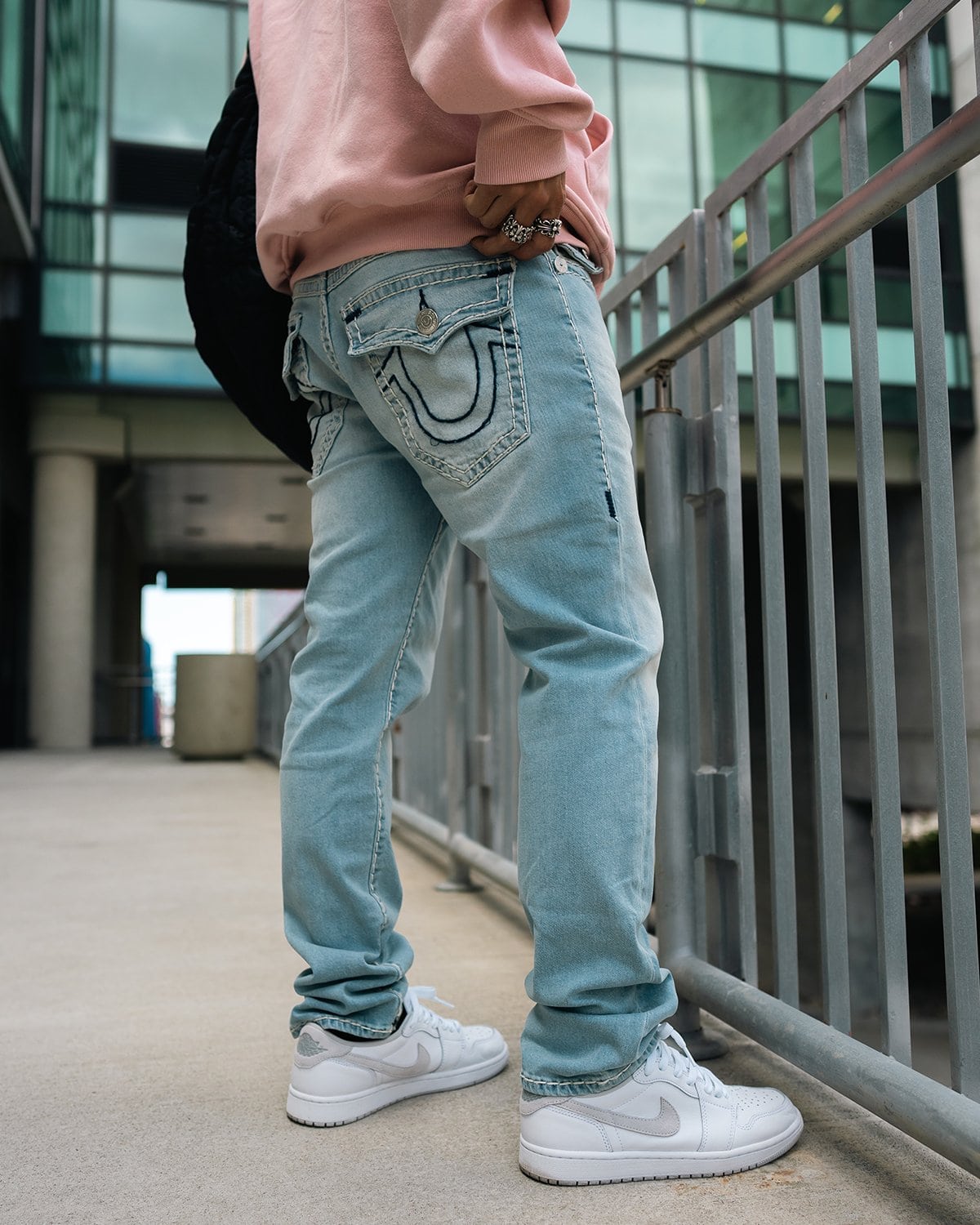
High-End Denim
Back in the ‘80s, designer jeans started with Calvin Klein, right now a shadow of its former self, but into the 2000s, this echelon stretched higher with the introduction of Diesel and seeing runway brands delve into the denim game and rework it around their distinctive aesthetics. Jeans are no longer indigo-colored woven cotton but a testament to how tight-fitting the material can get (also a nod to the ‘80s) and the number of embellishments and treatments that can be piled on:
Acne
We group Acne in with boundary-pushing, experimental unisex fashion in the present. Over 30 years ago, they started as a film studio that eventually launched a small-batch set of high-quality denim and shortly expanded to more washes, cuts, and an included D-ring belt. While the present aesthetic reflects Y2K nostalgia, Acne delivers Scandinavian utilitarianism coupled with longer-lasting materials and construction.
Diesel
Diesel began from a foundation of futuristic experimentation in the late ‘70s and benefitted from Glenn Martens’ creative direction down the line. These principles converge into a lifestyle brand intended to embody success and push the envelope of fit, washes, and construction.
Amiri
Some will say that Balmain’s biker jeans kicked off streetwear’s obsession with deconstructing and reworking denim. While Olivier Rousteing’s vision might have had a trickle-down effect that’s still felt, Amiri – launched in 2013 by Mike Amiri – ran with the concepts, elevating and exploring all the possibilities of biker silhouettes, rips, tears, distressing, and other treatments – first on ultra-skinny fits and on more relaxed cuts as of recent.
AG Jeans
We don’t usually use “denim” and “tailoring” in the same sentence, except maybe to discuss the growing scope of bespoke wardrobes. That said, Adriano Goldschmied started steering jeans in this direction close to 20 years ago: Now frequently called “The Godfather of Denim,” Goldschmied experimented with various cuts to deliver a fit and look similar to a pair of tailored trousers and gave them a softer feel. AG Jeans now spans multiple washes and incorporates more sustainable manufacturing processes, including water recycling, Ozone technology, and solar power.
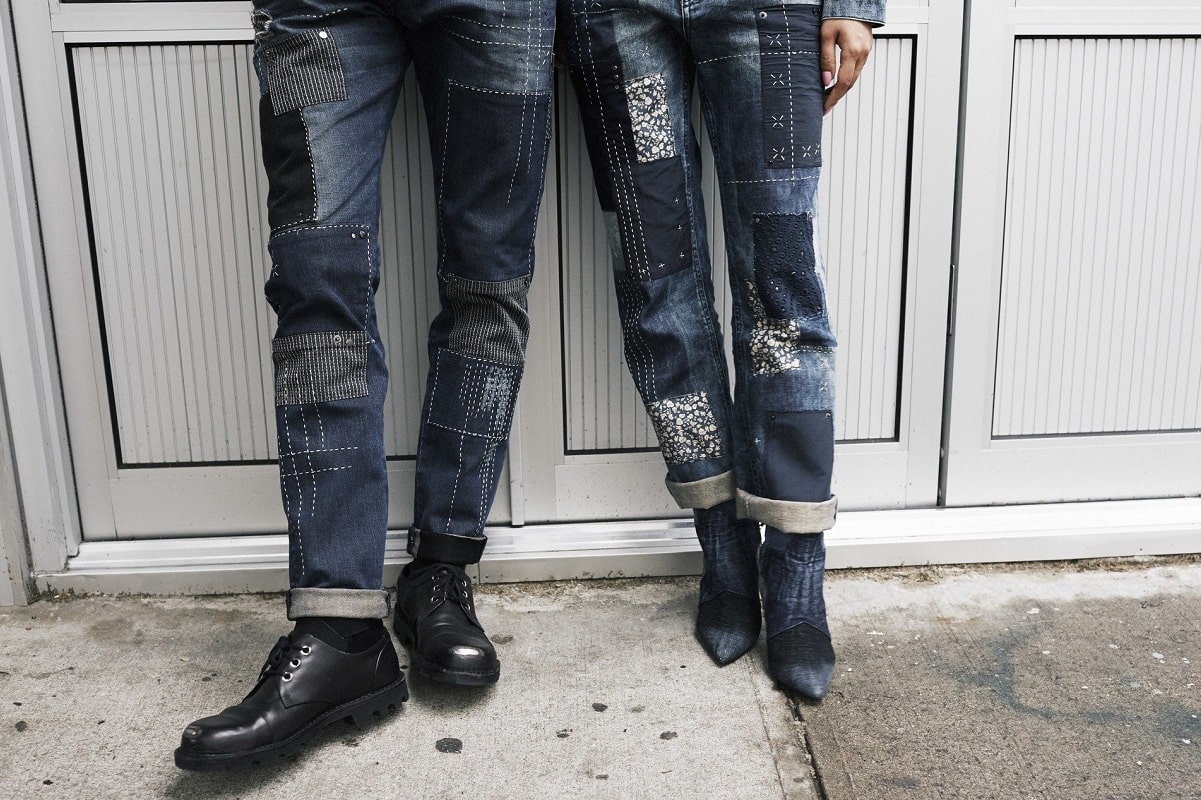
Rag & Bone
Rag & Bone denim attempts to find the sweet spot between classic, higher-quality construction and modern expectations for comfort. What results delivers that more tailored feel with less breaking in, and hits all the right notes – versatile mid-height cuts, slim to regular fits, and a hint of stretch if you feel you need it. Materials further vary from 100% cotton and raw – both taking longer to soften and shape to the body – to selvedge-inspired infused with spandex.
Yves Saint Laurent
No, we don’t typically think of Yves Saint Laurent as a denim brand – although runway presentations since Anthony Vaccarello’s appointment upend these expectations. On the menswear side, Vaccarello introduced a rocker-meets-mod muse clad in skinny to loosely cut denim evoking the ‘70s and ‘90s and processing it through a 2000s indie-sleaze perspective, ultimately ushering in a new phase of designer denim.
Our Legacy
When we think vintage denim, we automatically go toward raw and selvedge materials in a boot cut or tapered form. Yet, denim construction started shifting away from this model in the ‘70s, accelerating toward the variety we have today. Swedish brand Our Legacy attempts to capture these experimental decades, pulling primarily from ‘70s and ‘90s influences – for example, wider or flared cuts with a mix of fading, rips, and stone washing – and fusing this period aesthetic with organic cotton, linen, and Lyocell. Styles launch in small-batch collections to highlight more refined, detailed Scandinavian construction.
Kapital
Kapital further excels in the experimental denim market: Launching in Okayama in the mid-‘80s, Kapital initially attempted to replicate the look and feel of classic American jeans. Their construction still centers around this approach – particularly heritage materials and workwear inspiration – but their signature now comes from hand-stitched patches and other embellishments, proving that quality doesn’t always have to mean dull and predictable.
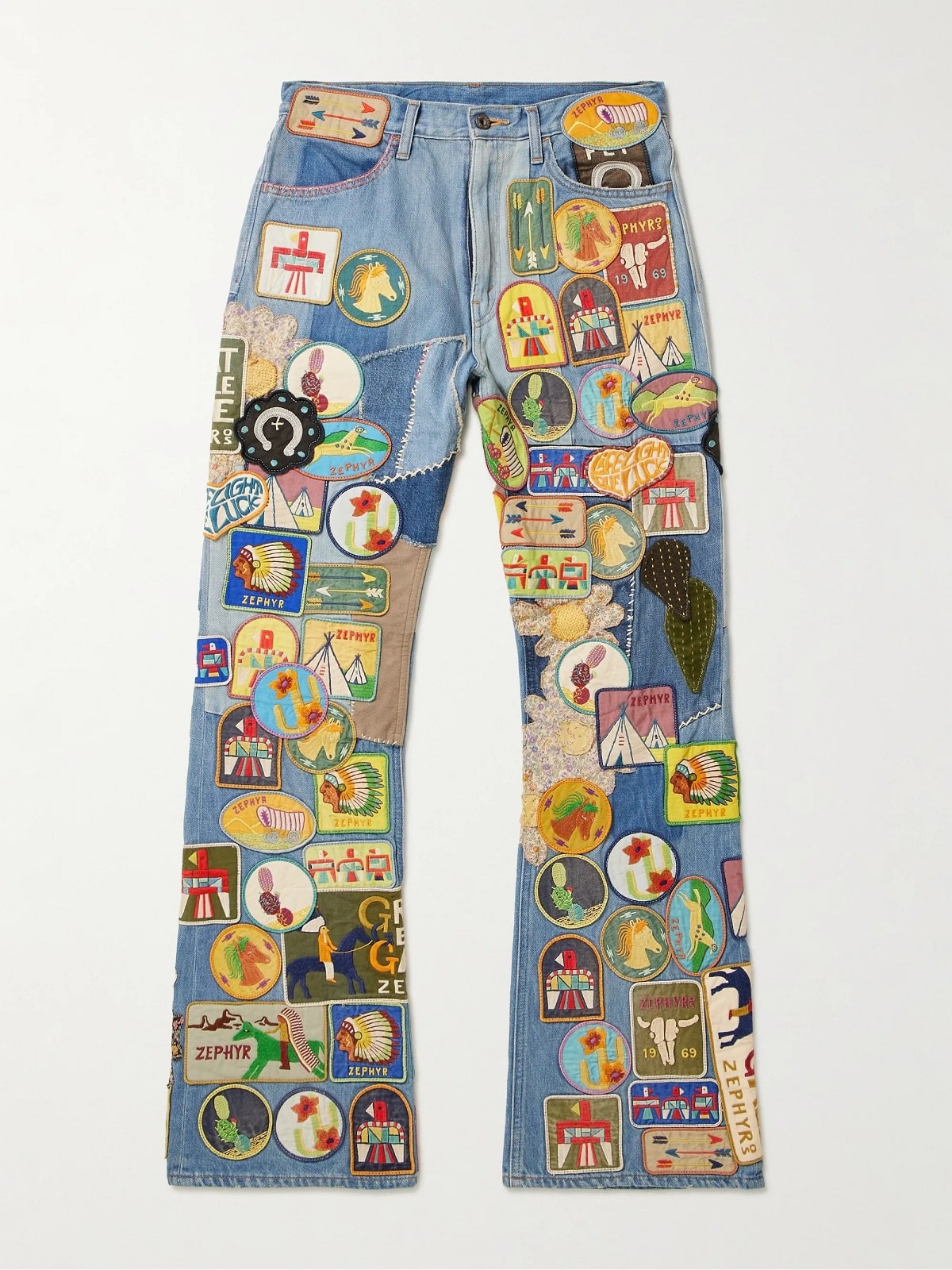
Selvedge and Raw Denim
We’ve created a separate category for these brands: As you can see, high-end denim doesn’t always mean stiff, deep indigo-dyed material, nor does a lower price point preclude you from trying out a more classic construction. Especially in response to renewed interest in heritage menswear – be it American workwear and denim or British tweed and Fair Isle knits – raw and selvedge materials have carved out their own market segment:
Uniqlo
Adding tech treatments to everyday items has long set Uniqlo apart. The brand has since charted its innovation-based stride into denim, particularly Japanese selvedge material with a just a slight stretch. They look and feel authentic, will shrink a bit (although not to the extent of 100% cotton), and still bleed in the wash.
RRL
Talk about Ralph Lauren and denim, and Polo jeans and their ‘90s hip-hop vibes immediately come to mind. RRL veers off course from this image – borrowing more from Western and Americana iconography than preppy sensibilities – and brings this vision to life through Japanese selvedge denim and primarily made-in-America construction. For the higher price point, the details – from rivets to an old-school waistband – get closer to how we perceive and seek out mid-century vintage denim.
A.P.C.
You want French minimalism where every detail gets evaluated for its role and purpose? A.P.C. has long been your brand – denim included. Since the 2000s, A.P.C. has served as a gateway toward raw and selvedge denim free of embellishments and requiring a longer breaking-in time, and they continue to do this well.
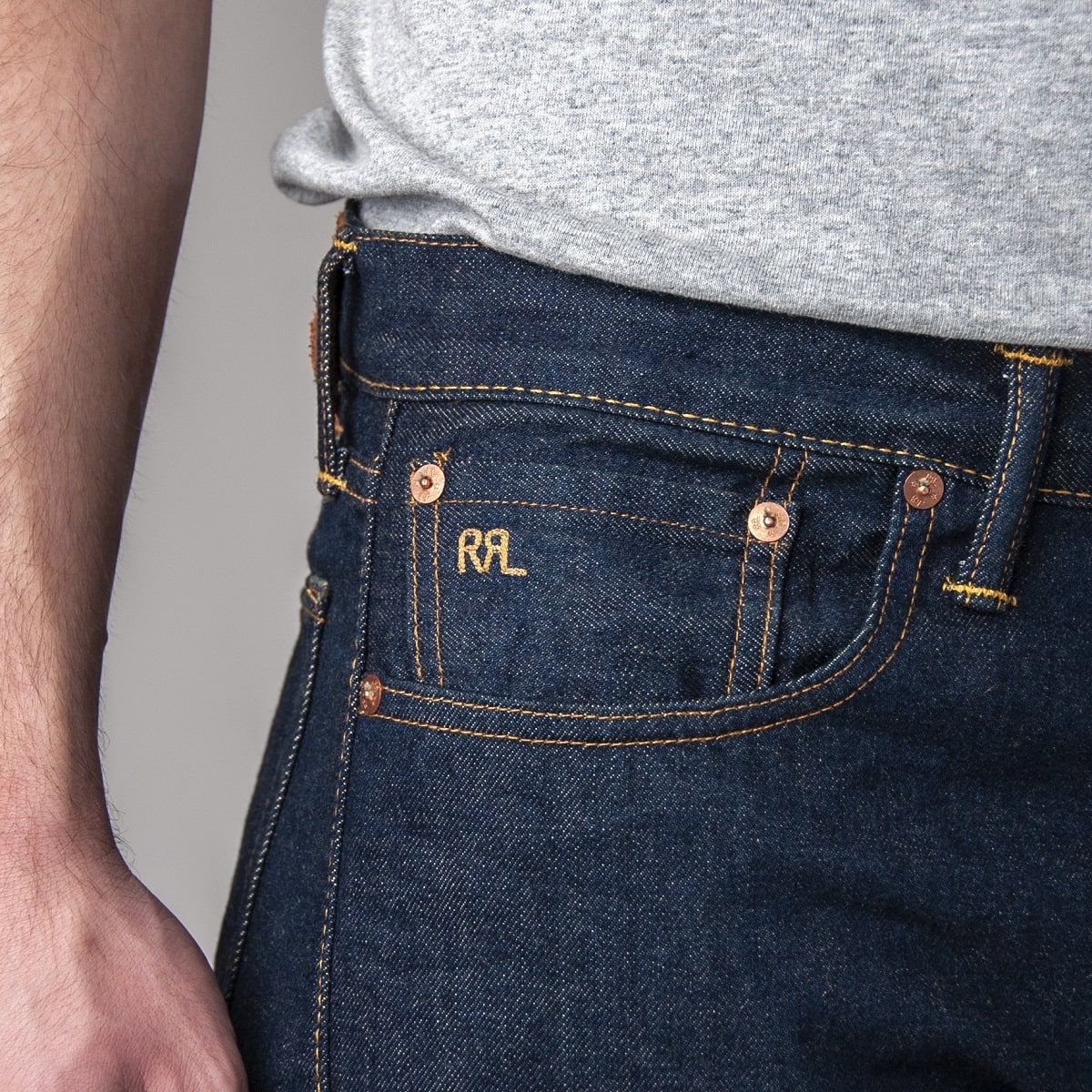
3sixteen
Based out of New York, 3sixteen embodies the fastidiousness higher-end denim brands have toward their product: What seems simple, if not basic, on the surface reflects an eye for detail through all stages of construction and manufacturing. In this case, that starts with souring fabrics from Kuroki Mills in Okayama – considered Japan’s denim capital – and determining the most hardwearing buttons, rivets, leather patches, and stitches to length a garment’s lifespan and replicate the look and feel of classic denim. This approach has since translated to 10 different fabrics and multiple fits.
Samurai
Samurai started out of a mission to capture the essence of American workwear denim. This objective has since resulted in one of the heaviest fabrics around – 21 oz. selvedge, or roughly double a typical mid-weight pair – created with 3.6 count slubbed threads. As such, the vibe exudes classic Americana, while the construction surpasses what you’ll find from even modern-day workwear.
OrSlow
The name says it all: As fast-fashion continues to pick up the pace, this Japanese denim brand turns back the dial to focus on small-batch selvedge construction, giving each pair a sense of individuality and often incorporating vintage workwear influences. Each pair, to some degree, further serves as a collectible with its own unique personality that ages with and shapes to the wearer.
Visvim
For Japanese denim enthusiasts, Visvim needs no explanation. For the rest of us, this cult brand captures the appeal of small-batch, highly detailed manufacturing and obsessing over every component – material to stitching and rivets – to craft a truly unique and individualistic pair of jeans.

Trending
2
3
4
5
6
7
8
9
10




